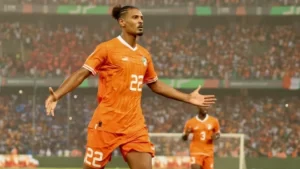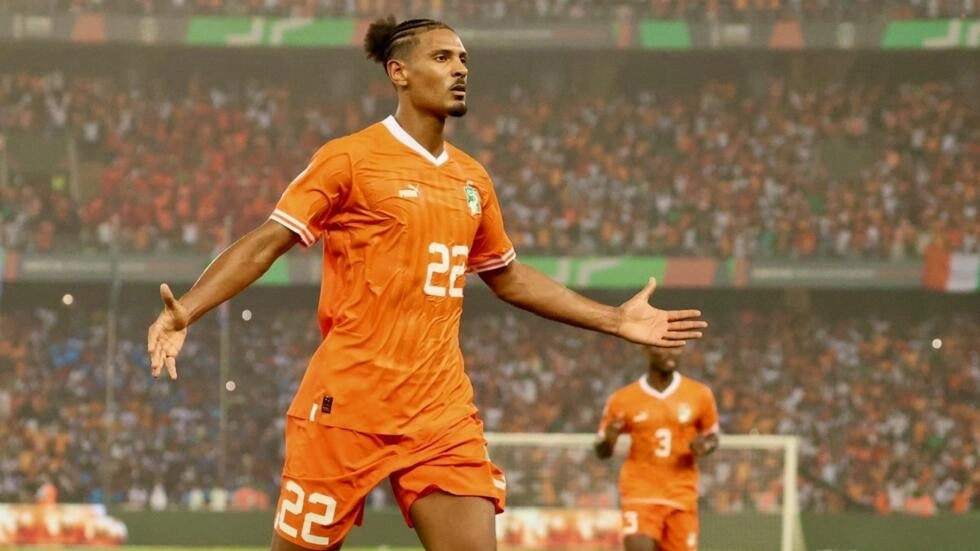AFCON 2024 final
Sebastien Haller was the hero with the only goal of the game as hosts Ivory Coast beat the Democratic Republic of Congo 1-0 to win through to the final of the Africa Cup of Nations on Wednesday.

Introduction: The African Cup of Nations (AFCON) is one of the most prestigious football tournaments in the world, showcasing the incredible talent and passion for the sport across the African continent. Every edition of the tournament carries its own excitement, but the AFCON 2024 final held recently exceeded all expectations, captivating football fans around the globe.
An Epic Battle: The AFCON 2024 final was a clash between two football giants, with both teams bringing their A-game to the pitch. The intense showdown took place in a jam-packed stadium, where spectators eagerly awaited the crowning of the new African champion.
A Display of Skill and Strategy: Both teams exhibited exceptional skill and strategy throughout the match, demonstrating the pinnacle of African football. The final was a thrilling back-and-forth affair, with players showcasing their technical abilities, tactical awareness, and incredible resilience.
Star Performers: Several players emerged as standout performers in the final, leaving an indelible mark on the game. From stunning goals to mesmerizing dribbles and heroic defensive displays, these athletes highlighted their immense talent and potential. Fans witnessed moments of brilliance that truly elevated the spectacle of the AFCON 2024 final.
Dramatic Moments: As the contest unfolded, there were moments of high drama that added to the overall narrative of the match. Nail-biting tackles, breathtaking saves by the goalkeepers, and nerve-wracking penalty shootouts kept viewers on the edge of their seats until the final whistle.
The Victorious Team: In the end, one team emerged victorious, etching their name in history as the AFCON 2024 champions. The triumph was not only a testament to their skill on the field but also to their unity, determination, and desire to claim the title.
Celebrations and Aftermath: The final whistle marked the beginning of jubilant celebrations, with fans flooding the streets, waving their flags, and chanting in joy. The victorious team’s homecoming was met with adoring crowds, as the country celebrated its new football heroes. Additionally, the tournament’s success spurred discussions about the future of African football and its potential to dominate the global stage.
Conclusion: The AFCON 2024 final was an unforgettable event, showcasing the very best of African football. The intense competition, stunning displays of skill, and moments of high drama made it a historic night. Through the AFCON tournament, the world witnessed the passion and talent that continue to reinforce the footballing prowess of the African continent. This final will undoubtedly be remembered as one of the most thrilling encounters in the tournament’s illustrious history.
Sébastien Haller celebrates opening the score in the CAN 2024 semi-final against DR Congo. © Pierre René-Worms, FMM
Starting for the first time at the tournament following injury, Borussia Dortmund striker Haller connected with a Max-Alain Gradel cross in the 65th minute at the Ebimpe Olympic Stadium, his shot looping over the goalkeeper and in.
That was enough to settle a tense but open semi-final showdown, and the Ivorians will now face Nigeria at the same venue on Sunday to decide who takes the title.
The two-time champions are the first host country to reach the final of the Cup of Nations since Egypt in 2006, and the turnaround is absolutely remarkable for a team that was on the brink of elimination in the group stage.
In contrast, it was an agonising defeat for DR Congo, who had been dreaming of a first appearance in an AFCON final since they were champions as Zaire in 1974.
Ivory Coast’s run at the tournament had been described on the eve of this game as “miraculous” by their own interim coach Emerse Fae, the man who replaced the sacked Jean-Louis Gasset following embarrassing results in the group stage.
Humiliated and on the verge of elimination after a 4-0 defeat by Equatorial Guinea on January 22, this was their first match at the Ebimpe Olympic Stadium on Abidjan’s dusty outskirts since then.
The Elephants scraped through to the last 16 as the last of the four best third-placed teams, then ousted reigning champions Senegal on penalties.
They followed that by beating Mali in the quarter-finals — despite playing most of the match with 10 men — with their winner coming in added time in extra time.
Oumar Diakite, the match-winner against Mali, was sent off while celebrating his goal and was suspended here along with captain Serge Aurier, Odilon Kossounou and Christian Kouame.
Among those coming in were Brighton winger Simon Adingra, who got the equaliser against Mali, and Haller, the talismanic forward who was finally fully fit.
DR Congo were looking to avenge their 3-1 defeat by the Ivorians in their last appearance in the AFCON semi-finals, in 2015.
Congo protest
Their players have been spurred on during this tournament by a determination to raise awareness of the plight of millions of Congolese affected by ongoing violence in the east of the country.
The Congo team used the national anthem to protest, each covering their mouth with one hand and using the other to imitate a gun pointing at their heads.
Apparently unperturbed by the hostile home crowd, the Leopards started well and had the ball in the net in the ninth minute.
Cedric Bakambu knocked the ball out of goalkeeper Yahia Fofana’s grasp and in at a corner, but the goal was disallowed by the Libyan referee for a foul.
The biggest chances of the first half fell to the Ivorians, who grew as a threat as the interval approached.
Haller rose unmarked in the box only to somehow head wide from Wilfried Singo’s inviting cross in the 40th minute. Moments later, Franck Kessie crashed a shot off the post.
Kessie threatened again just before the hour mark with a powerful strike that forced goalkeeper Lionel Mpasi into action, but the breakthrough followed soon after.
Watch also
